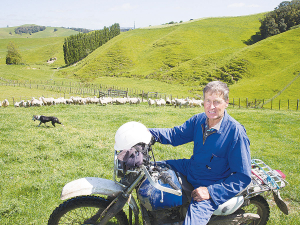DairyNZ chair wants cross-party deal
New DairyNZ chair Tracy Brown says bipartisan agreement among political parties on emissions pricing and freshwater regulations would greatly help farmers.
 Graham Pinnell believes the HWEN hybrid maybe a better model for the agricultural sector than the farm level pricing option.
Graham Pinnell believes the HWEN hybrid maybe a better model for the agricultural sector than the farm level pricing option.
OPINION: He Waka Eke Noa proposed two options for pricing agricultural emissions. Feedback from farmers strongly supported farm-level pricing in preference to the hybrid option.
Amongst the complexity there are a few simple facts that inform how we could proceed from here.
The first is that the volume of methane emissions is solely dependent on how much dry matter is consumed by livestock. What species, how old and heavy they are, how productive they are and whether milk, meat, wool or velvet is produced do not make a scrap of difference to the volume methane emissions.
That means the only way methane emissions can be reduced is by reducing the area of pastoral farming.
It also means that, given the area of pastoral farming is being eroded by carbon and production forestry, horticulture and urban spread, methane emissions must be reducing.
The evidence points to stable emissions in the recent past, and the current carbon farming bonanza is yet to be captured in the statistics. On the other hand, there are very few opportunities to increase dry matter intake because our farming systems are dominated by pasture, being by far the cheapest fodder, thereby capping the amount of supplementary feed.
The other greenhouse gas associated with livestock is nitrous oxide. Nitrogen from fodder is partially retained in product from the animal and cycled back to the land as dung and urine. A fraction of that is converted into nitrous oxide, mainly from urine patches. Again, the volume of emissions is dependent on how much dry matter is consumed but is also dependent a little on production and a lot on the species. Emissions per stock unit are much less for sheep than cattle. Deer emissions are intermediate between sheep and cattle.
Given that nitrous oxide is a long-lived gas and could be priced as for carbon dioxide, over time the price is likely to transition to that of the Emissions Trading Scheme. Even using the current NZU price for a ton of carbon dioxide-equivalent with no discount means that the price of nitrous oxide emissions is trivial in comparison with market prices.
For example, it is less than 0.5% of the meat value of a cattle beast or lamb, and even less in relation to the milk value from a dairy cow.
Putting these methane and nitrous oxide observations together means that farm-level reporting serves no purpose yet requires farmers to file data that cannot realistically be audited. That data is comprehensive, requiring tallies and liveweights for each class of stock as they vary throughout the farming year, taking account of sales, purchases, births and deaths.
Let’s breathe life back into the HWEN hybrid option. It does not have this data requirement yet incentivises mitigations such as vaccines, feed additives and animal genetics as they are developed and approved. Auditing would be a breeze in comparison.
The HWEN farm-level option incentivises methane reduction by putting a price on all methane. Currently, there are no viable mitigations, so to be effective, the price has to be strong enough to force farm sales of the financially weak. What happens to the income from pricing methane? The first call would be to fund the bureaucracy required to operate the scheme.
The Climate Change Commission, in considering the farm-level option, has proposed a refund based on production of milk, meat and other products. This is Robin Hood in reverse, whereby those on more versatile soils and having inherently higher productivity prey on the financially weak with less favourable soils or climate. Even when mitigations become available and emission pricing is set to incentivise their use, financially stressed farmers will still be forced to sell if the HWEN farm-level option is adopted.
Rather that the HWEN farm-level option charging for all methane, best be more targeted and just incentivise the desired changes using consistent prices and the HWEN hybrid model.
Graham Pinnell is a retired Cambridge farmer and has served on two Crown regulatory boards.
Coming in at a year-end total at 3088 units, a rise of around 10% over the 2806 total for 2024, the signs are that the New Zealand farm machinery industry is turning the corner after a difficult couple of years.
New Zealand's animal health industry has a new tool addressing a long-standing sustainability issue.
The Government has announced that ACC will be a sponsor of this year's FMG Young Farmer of the Year competition.
As veterinary student numbers grow to help address New Zealand's national workforce shortge, Massey University's School of Veterinary Science is inviting more veterinary practices to partner in training the next generation of vets.
South Island dairy farmers will soon be able to supply organic milk to Fonterra.
Norwood has announced the opening of a new Tasman dealership at Richmond near Nelson next month.

OPINION: Meanwhile, red blooded Northland politician Matua Shane Jones has provided one of the most telling quotes of the year…
OPINION: This old mutt has been around for a few years now and it seems these ‘once in 100-year’ weather…